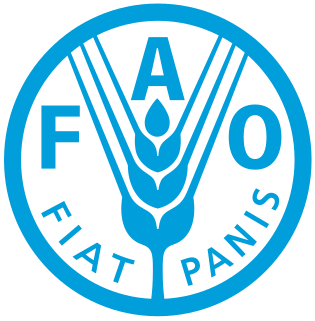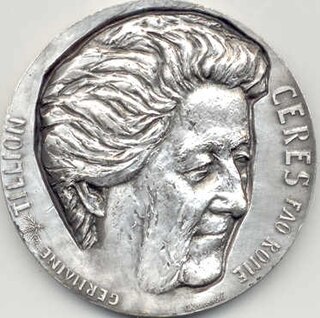
Extreme poverty, deep poverty, abject poverty, absolute poverty, destitution, or penury, is the most severe type of poverty, defined by the United Nations (UN) as "a condition characterized by severe deprivation of basic human needs, including food, safe drinking water, sanitation facilities, health, shelter, education and information. It depends not only on income but also on access to services". Historically, other definitions have been proposed within the United Nations.

The Food and Agriculture Organization of the United Nations (FAO) is a specialized agency of the United Nations that leads international efforts to defeat hunger and improve nutrition and food security. Its Latin motto, fiat panis, translates to "let there be bread". It was founded on 16th October 1945.

The United Nations Organization (UNO) or just United Nations (UN) is an intergovernmental organization whose purpose is to maintain international peace and security, develop friendly relations among nations, achieve international cooperation, and be a centre for harmonizing the actions of nations. It is the world's largest and most familiar international organization. The UN is headquartered on international territory in New York City, and has other main offices in Geneva, Nairobi, Vienna, and The Hague.

The United Nations Environment Programme (UNEP) is responsible for coordinating responses to environmental issues within the United Nations system. It was established by Maurice Strong, its first director, after the United Nations Conference on the Human Environment in Stockholm in June 1972. Its mandate is to provide leadership, deliver science and develop solutions on a wide range of issues, including climate change, the management of marine and terrestrial ecosystems, and green economic development. The organization also develops international environmental agreements; publishes and promotes environmental science and helps national governments achieve environmental targets.
The International Treaty on Plant Genetic Resources for Food and Agriculture, is a comprehensive international agreement in harmony with the Convention on Biological Diversity, which aims at guaranteeing food security through the conservation, exchange and sustainable use of the world's plant genetic resources for food and agriculture (PGRFA), the fair and equitable benefit sharing arising from its use, as well as the recognition of farmers' rights. It was signed in 2001 in Madrid, and entered into force on 29 June 2004.

The first World Food Conference was held in Rome in 1974 by the United Nations under the auspices of the UN Food and Agriculture Organization (FAO), in the wake of the devastating famine in Bangladesh in the preceding two years.

La Vía Campesina is an international farmers organization founded in 1993 in Mons, Belgium, formed by 182 organisations in 81 countries, and describing itself as "an international movement which coordinates peasant organizations of small and middle-scale producers, agricultural workers, rural women, and indigenous communities from Asia, Africa, America, and Europe".
World Food Summits are convened by the Food and Agriculture Organization of the United Nations.

The Codex Alimentarius is a collection of internationally recognized standards, codes of practice, guidelines, and other recommendations published by the Food and Agriculture Organization relating to food, food production, food labeling, and food safety.

The D-8 Organization for Economic Cooperation, also known as Developing-8, is an organisation for development co-operation among the following countries: Bangladesh, Egypt, Indonesia, Iran, Malaysia, Nigeria, Pakistan, and Turkey. The objectives of D-8 Organization for Economic Cooperation are to improve member states' position in the global economy, diversify and create new opportunities in trade relations, enhance participation in decision-making at international level, and improve standards of living. D-8 is a global arrangement rather than a regional one, as the composition of its members reflects. Organization for Economic Cooperation (D-8) is a forum with no adverse impact on bilateral and multilateral commitments of the member countries, emanating from their membership to other international or regional organizations.

The Commission for Social Development (CSocD) is one of the eight functional commissions established by the United Nations Economic and Social Council (ECOSOC) since 1946 to advise and assist it in carrying its work.
The International Union of Food Science and Technology (IUFoST) is the global scientific organization and voice for food science and technology representing more than 300,000 food scientists, engineers and technologists through its work in more than 100 countries. It is a voluntary, non-profit association of national food science organizations. IUFoST is the only elected scientific representative of Food Science and Technology in the International Science Council (ISC), elected by its peers across scientific disciplines. It is the only global representative of food science and technology to notable organizations such as the World Health Organization (WHO), Food and Agriculture Organization (FAO) of the United Nations, United Nations Development Programme and (UNDP), CODEX Alimentarius.

The right to food, and its variations, is a human right protecting the right of people to feed themselves in dignity, implying that sufficient food is available, that people have the means to access it, and that it adequately meets the individual's dietary needs. The right to food protects the right of all human beings to be free from hunger, food insecurity and malnutrition. The right to food does not imply that governments have an obligation to hand out free food to everyone who wants it, or a right to be fed. However, if people are deprived of access to food for reasons beyond their control, for example, because they are in detention, in times of war or after natural disasters, the right requires the government to provide food directly.
Tokyo International Conference on African Development (TICAD) is a conference held regularly with the objective "to promote high-level policy dialogue between African leaders and development partners." Japan is a co-host of these conferences. Other co-organizers of TICAD are the United Nations Office of the Special Advisor on Africa (UN-OSAA) and the United Nations Development Programme (UNDP). The series has included: TICAD I (1993); TICAD II (1998); TICAD III (2003); TICAD IV (2008); TICAD V (2013). The next conference is scheduled for Kenya in August 2016. It will be the first time the event will be held in Africa, previous conferences were all held in Japan.
The Rome Declaration on World Food Security is a document adopted at the 1996 World Food Summit took place in Rome, Italy between 13 and 17 November 1996. The summit was organised by the Food and Agriculture Organization of the United Nations (FAO). The Declaration reaffirms the right of everyone to have access to safe and nutritious food consistent with the right to adequate food and the fundamental right of everyone to be free from hunger and pledges political will and common and national commitment to achieving food security for all and to an ongoing effort to eradicate hunger in all countries with an immediate view to reducing the number of undernourished people to half their present level no later than 2015. Therefore, the document has important significance in relation to Food security and the Right to food. Signatories commit to the implementation of the World Food Summit Plan of Action.
The Voluntary Guidelines to support the Progressive Realization of the Right to Adequate Food in the Context of National Food Security, also known as the Right to Food Guidelines, is a document adopted by the Food and Agriculture Organization of the United Nations in 2004, with the aim of guiding states to implement the right to food. It is not legally binding, but directed to states' obligations to the right to food under international law. In specific, it is directed towards States Parties to the International Covenant on Economic, Social and Cultural Rights (ICESCR) and to States that still have to ratify it.
The Universal Declaration on the Eradication of Hunger and Malnutrition was adopted on 16 November 1974, by governments who attended the 1974 World Food Conference that was convened under General Assembly resolution 3180 (XXVIII) of 17 December 1973. It was later endorsed by General Assembly resolution 3348 (XXIX), of 17 December 1974. This Declaration combined discussions of the international human right to adequate food and nutrition with an acknowledgement of the various economic and political issues that can affect the production and distribution of food related products. Within this Declaration, it is recognised that it is the common purpose of all nations to work together towards eliminating hunger and malnutrition. Further, the Declaration explains how the welfare of much of the world's population depends on their ability to adequately produce and distribute food. In doing so, it emphasises the need for the international community to develop a more adequate system to ensure that the right to food for all persons is recognised. The opening paragraph of the Declaration, which remains to be the most recited paragraph of the Declaration today, reads:
Every man, woman and child has the inalienable right to be free from hunger and malnutrition in order to develop fully and maintain their physical and mental faculties.

Development is a human right that belongs to everyone, individually and collectively. Everyone is “entitled to participate in, contribute to, and enjoy economic, social, cultural and political development, in which all human rights and fundamental freedoms can be fully realized,” states the groundbreaking UN Declaration on the Right to Development, proclaimed in 1986.
The Declaration on the Rights of Peasants (UNDROP), officially United Nations Declaration on the Rights of Peasants and Other People Working in Rural Areas, is an UNGA resolution on Human rights with "universal understanding", adopted by the United Nations in 2018.

The Non-Aligned Movement (NAM) is a forum of 120 developing world states that are not formally aligned with or against any major power bloc. After the United Nations, it is the largest grouping of states worldwide.










